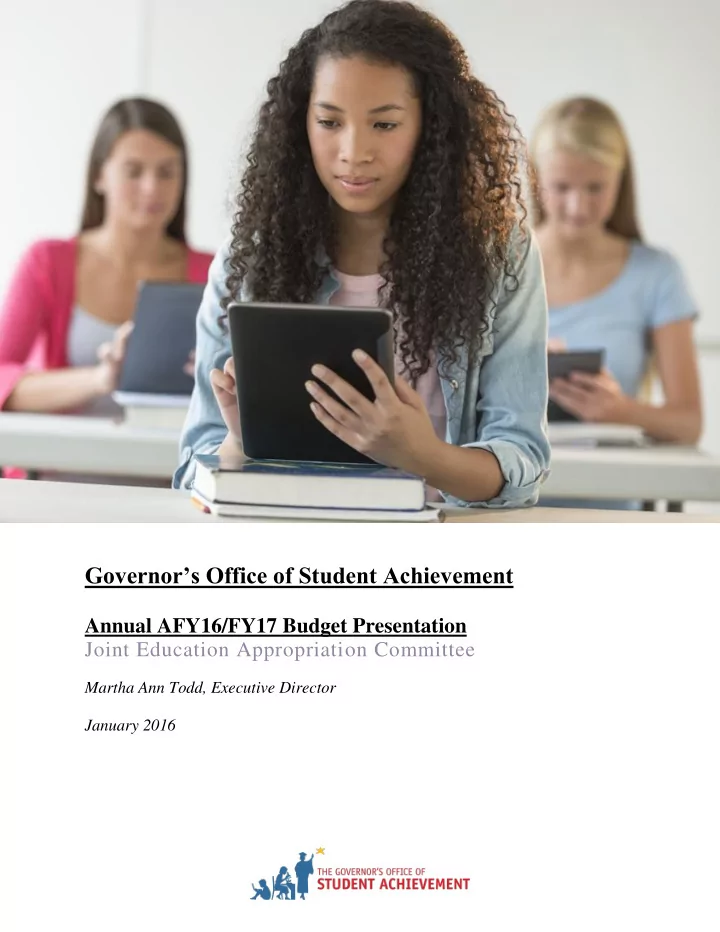

Governor’s Office of Student Achievement Annual AFY16/FY17 Budget Presentation Joint Education Appropriation Committee Martha Ann Todd, Executive Director January 2016
Table of Contents Agency Summary Information .................................................................................................................. 1 Agency Overview ........................................................................................................................................ 1 Professional Learning Grants and the Reading Mentor Program ......................................................... 2 Innovation Fund .......................................................................................................................................... 5 Governor’s Honors Program ..................................................................................................................... 9 Academic Auditing .................................................................................................................................... 11 State Report Cards & Single Statewide Accountability System ........................................................... 13 GA•AWARDS .......................................................................................................................................... 14 Research and Evaluation .......................................................................................................................... 16 Race to the Top Grant Evaluation ........................................................................................................... 18 Connections for Classrooms Grant Program ......................................................................................... 19 YouScience Pilot Program ........................................................................................................................ 21 0
Governor's Office of Student Achievement (GOSA) AFY16 Budget Presentation Summary Information As the state’s P -20 education agency, GOSA aims to increase student achievement, school completion, and life opportunities for all Georgia students. To achieve our mission, GOSA conducts all business according to high standards of transparency, accessibility, objectivity, strategic collaboration, and innovation. GOSA provides policy support to the Governor and ultimately to the citizens of Georgia through: A) Communicating meaningful education data to stakeholders; B) Providing research support and data analysis on various education programs in Georgia to inform the Governo r’s policy, budget, and legislative efforts; C) Auditing education programs to ensure fidelity at the district and school-level to performance and accountability requirements; and D) Identifying, supporting, and sustaining educational innovations that align wi th the Governor’s education priorities. GOSA is supportive of the Governor's recommendations for AFY 16 and FY17. Agency Overview - Annual operating budget in FY16: $19,574,080 - The Governor’s recommended annual operating budget in AFY16 does not chang e. - GOSA’s FY1 6 staff numbers: 47 employees, including 21 regional field staffers serving as Reading Mentors or professional learning support and 2 part-time interns. - GOSA employed approximately 100 summer instructors and resident advisors for four weeks to work with the Governor ’s Honors Program (GHP) in June-July 2015. 1
Professional Learning Grants and the Reading Mentor Program The Governor’s Office of Student Achievement ( GOSA) has: - Successfully launched the K-3 Literacy Grant in all (16) Regional Educational Service Agencies (RESAs). The RESA grants allow 26 expert literacy educators to design and implement professional learning that is supported by on-site follow-up and coaching in 61 individual schools to further teacher knowledge of successful interventions for struggling early readers. The mid- yea r evaluation summary is found on GOSA’s website, 2015-2016 RESA Growing Readers Mid- Year Evaluation Report. Key mid-year evaluation findings include: All RESAs are implementing all components of the Growing Readers Program (GRP) as of November 2015, including the completion of baseline observations, baseline assessments, and Professional Learning Session One. Professional Learning Session One was interactive, offered valuable networking and collaboration opportunities, and provided teachers with useful strategies that they are excited to start using in the classroom. Teachers need support in aligning instruction to the Georgia Standards of Excellence. Teachers are rarely conferencing with students one-on-one in the classroom, in which they listen to students read, provide immediate feedback, and set goals together. Teachers need help using assessment data meaningfully at the classroom and student level. Teachers need a better balance of engaging whole group instruction, small group instruction, and independent practice during literacy blocks. The RESA partnership is functional, has clear and mutual goals, completes tasks efficiently, and improves relationships and access to resources among RESAs. Reading specialists identified several positive impacts of the GRP, including observable changes in teacher practice, unity among RESAs, networking among teachers, schools, and districts, and increased supports for struggling readers. The Collaboration Self-Assessment Tool results demonstrate that an initiative like the GRP, which aims to provide standardized professional learning for educators in Georgia through a unified RESA effort, is both possible and beneficial to RESAs and the schools they serve. Data are not available yet for student outcomes, so there are no preliminary findings to report. These outcomes will be assessed in the end-of-year report. - Implemented year 4 of the Reading Mentor Program: A Language and Literacy Partnership, which utilizes varied coaching methods to improve efficacy among K-3 teachers in teaching literacy. GOSA has collaborated with 62 schools within 22 school districts. Sixty-three percent of students served by the Reading Mentor Program (RMP) during the 2012-2015 cycle are reading at or above benchmark, which represents a twelve percent increase from Year 1. The RMP 2015-2016 Mid-Year Evaluation Report provides a status report for the current year’s work with this new cohort of districts and schools. - Made available a mini-grant for districts to support teacher participation in Code.org training provided at Northeast Georgia RESA and Middle Georgia RESA during the summer of 2016. These grants will provide financially-challenged districts with funds to meet the required stipend 2
match and pay travel costs for teachers who participate in this computer science and coding professional learning opportunity. - Partnered with Project Lead The Way to provide professional learning for teacher preparation in STEM courses in south and southwest Georgia (3 RESA areas – Southwest, Chattahoochee-Flint, and Coastal Plains). These programs support the implementation of rigorous K-12 pathways in computer science, engineering, and biomedical sciences through in-depth teacher professional development. Fifty-eight schools (36 elementary, 12 middle, and 10 high) schools representing 14 districts in rural areas have applied to participate in the program.. - Awarded the first round of the Innovation in K-8 Mathematics and/or K-12 Computer Science/Coding Professional Learning Grants. This competitive grant program supports local education agencies (LEAs), RESAs and individual schools in improving instruction in those subject areas through the development of innovative professional learning models. Each grant winner will receive $150,000 to support professional learning programs that promote student achievement in mathematics or expand student access to high-quality computer science/coding programs. Grant recipients will evaluate the effectiveness of the initiatives and submit their findings toGOSA. The state will use these results for advisement in determining the best practices in professional learning for mathematics and computer science/coding. The awarded grants are as follows: 3
Recommend
More recommend